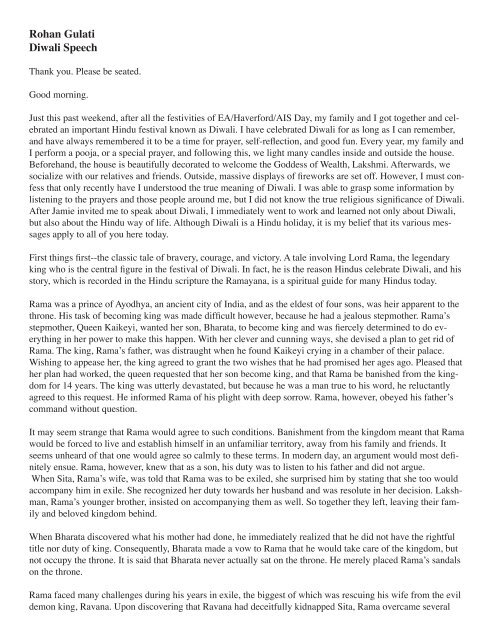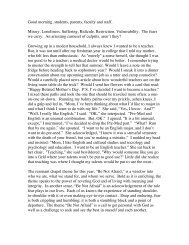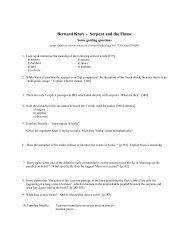Rohan Gulati Diwali Speech - Episcopal Academy
Rohan Gulati Diwali Speech - Episcopal Academy
Rohan Gulati Diwali Speech - Episcopal Academy
You also want an ePaper? Increase the reach of your titles
YUMPU automatically turns print PDFs into web optimized ePapers that Google loves.
<strong>Rohan</strong> <strong>Gulati</strong><strong>Diwali</strong> <strong>Speech</strong>Thank you. Please be seated.Good morning.Just this past weekend, after all the festivities of EA/Haverford/AIS Day, my family and I got together and celebratedan important Hindu festival known as <strong>Diwali</strong>. I have celebrated <strong>Diwali</strong> for as long as I can remember,and have always remembered it to be a time for prayer, self-reflection, and good fun. Every year, my family andI perform a pooja, or a special prayer, and following this, we light many candles inside and outside the house.Beforehand, the house is beautifully decorated to welcome the Goddess of Wealth, Lakshmi. Afterwards, wesocialize with our relatives and friends. Outside, massive displays of fireworks are set off. However, I must confessthat only recently have I understood the true meaning of <strong>Diwali</strong>. I was able to grasp some information bylistening to the prayers and those people around me, but I did not know the true religious significance of <strong>Diwali</strong>.After Jamie invited me to speak about <strong>Diwali</strong>, I immediately went to work and learned not only about <strong>Diwali</strong>,but also about the Hindu way of life. Although <strong>Diwali</strong> is a Hindu holiday, it is my belief that its various messagesapply to all of you here today.First things first--the classic tale of bravery, courage, and victory. A tale involving Lord Rama, the legendaryking who is the central figure in the festival of <strong>Diwali</strong>. In fact, he is the reason Hindus celebrate <strong>Diwali</strong>, and hisstory, which is recorded in the Hindu scripture the Ramayana, is a spiritual guide for many Hindus today.Rama was a prince of Ayodhya, an ancient city of India, and as the eldest of four sons, was heir apparent to thethrone. His task of becoming king was made difficult however, because he had a jealous stepmother. Rama’sstepmother, Queen Kaikeyi, wanted her son, Bharata, to become king and was fiercely determined to do everythingin her power to make this happen. With her clever and cunning ways, she devised a plan to get rid ofRama. The king, Rama’s father, was distraught when he found Kaikeyi crying in a chamber of their palace.Wishing to appease her, the king agreed to grant the two wishes that he had promised her ages ago. Pleased thather plan had worked, the queen requested that her son become king, and that Rama be banished from the kingdomfor 14 years. The king was utterly devastated, but because he was a man true to his word, he reluctantlyagreed to this request. He informed Rama of his plight with deep sorrow. Rama, however, obeyed his father’scommand without question.It may seem strange that Rama would agree to such conditions. Banishment from the kingdom meant that Ramawould be forced to live and establish himself in an unfamiliar territory, away from his family and friends. Itseems unheard of that one would agree so calmly to these terms. In modern day, an argument would most definitelyensue. Rama, however, knew that as a son, his duty was to listen to his father and did not argue.When Sita, Rama’s wife, was told that Rama was to be exiled, she surprised him by stating that she too wouldaccompany him in exile. She recognized her duty towards her husband and was resolute in her decision. Lakshman,Rama’s younger brother, insisted on accompanying them as well. So together they left, leaving their familyand beloved kingdom behind.When Bharata discovered what his mother had done, he immediately realized that he did not have the rightfultitle nor duty of king. Consequently, Bharata made a vow to Rama that he would take care of the kingdom, butnot occupy the throne. It is said that Bharata never actually sat on the throne. He merely placed Rama’s sandalson the throne.Rama faced many challenges during his years in exile, the biggest of which was rescuing his wife from the evildemon king, Ravana. Upon discovering that Ravana had deceitfully kidnapped Sita, Rama overcame several
difficulties with courage and a strong sense of duty. Rama killed Ravana in an epic battle and successfullyrescued his wife, proving himself worthy to the title of king. After fourteen years of exile, a victorious Rama,along with Sita and Lakshman, finally return to their rightful kingdom. The joyous people of Ayodhya lit lampsto guide Rama, Sita, and Lakshman back safely though the dark night and to express their happiness. A blissfulkingdom was re-established. Here, we have the theme of good prevailing over evil, and right rising abovewrong.This story contains several important themes that are celebrated during <strong>Diwali</strong>. In fact, the name <strong>Diwali</strong> tracesits origin to this story. <strong>Diwali</strong> is called “The Festival of Lights” because the town of Ayodhya had been eagerlyanticipating Rama’s return home and was now celebrating with lamps that would illuminate his path. The word<strong>Diwali</strong> is an abbreviated form of Deepavali, which literally translates to a “row of lights.” Light is a God-givengift and has forever been a universal symbol for hope and optimism, especially in the face of darkness and evil.It can also be interpreted that light symbolizes knowledge and wisdom, while darkness represents ignorance.For this reason, during <strong>Diwali</strong>, light is placed in and around the house to, in effect, destroy the darkness and theevil influences around us.<strong>Diwali</strong> occurs on the last day of the lunar year, the day on which the moon does not rise. This year it was on November9th. It is actually a five day festival, the main festival occurring on the third day. This is the day we lightlamps, set off firecrackers, and exchange gifts and sweets. The themes for the five days are wealth, prosperity,strength, unity, knowledge, and removal of anger, hatred, and ill-will. In this way, the message of <strong>Diwali</strong> trulyapplies to all.<strong>Diwali</strong> is celebrated by Hindus all over the world, but the most magnificent celebrations take place in India,as the people of India receive this holiday with great joy and enthusiasm. The celebrations start with a pooja,which, as mentioned before are the prayers and rituals done to honor the various gods and goddesses of theHindu religion. It is important to keep in mind that Hinduism is a monotheistic religion and the various deitiesare simply manifestations of the different characteristics of God.For me, pooja is mainly a time for meditation, prayer, and reading from the ancient scriptures. During the pooja,we recite prayers to Lakshmi, the goddess of wealth and good fortune. Wealth extends beyond money, to thingssuch as knowledge, love, and dedication. We also light candles and incense sticks and sing an aarti, which is adevotional song, to conclude the prayers. In this way, a pooja is very similar to the services held in chapel.Once the prayers are complete, the festivities begin. Families and friends gather together and exchange greetings,sweets, and gifts. Dazzling displays of fireworks are set off, and candles are lit, reemphasizing the victoryof light over darkness. Children hang colored lanterns and other decorations around the house, and youngerchildren paint floor paintings called “rangoli.” It is a time of happiness and togetherness for the family andteaches us to strive for goodness in our minds, bodies, and spirits, because after all, it is goodness that wins inthe end.I want to conclude my speech today by speaking a little more about what <strong>Diwali</strong> and more specifically, Hinduismmeans to me. I believe this holiday is important because it explores the fundamental Hindu principles ofduty, or dharma, and instills in me a deep respect and love for God. <strong>Diwali</strong> teaches me to show respect, kindness,and love for others, even for people you aren’t fond of. <strong>Diwali</strong>’s lessons are models for how I should act,and I take them to heart. All the virtues exemplified throughout <strong>Diwali</strong> can be incorporated into our daily lives.I also believe that through these religious holidays, I can gain a closer connection with God. God is a source ofknowledge, power, strength, comfort, and hope, and I turn to God whenever I am in need of help and internalstrength. Chapel is the place where I can connect with God, reflect on myself, and have the opportunity to hearabout the reflections of others. I am proud to have been able to share with you all today an important part of mylife, and I hope that some of the lessons that have affected my life will affect a part of yours as well.Thank you.
















